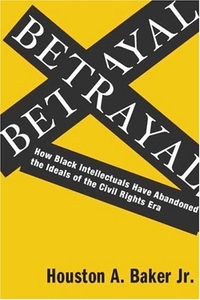

Purchase
How Black Intellectuals Have Abandoned the Ideals of the Civil Rights Era
Columbia University Press
February 2008
On Sale: April 7, 2008
272 pages
ISBN: 0231139640
EAN: 9780231139649
Hardcover
Add to Wish List
Non-Fiction Political | Non-Fiction History
Houston A. Baker Jr. condemns those black intellectuals
who, he believes, have turned their backs on the tradition
of racial activism in America. These individuals choose
personal gain over the interests of the black majority,
whether they are espousing neoconservative positions that
distort the contours of contemporary social and political
dynamics or abandoning race as an important issue in the
study of American literature and culture. Most important,
they do a disservice to the legacy of W. E. B. Du Bois,
Martin Luther King Jr., and others who have fought for
black rights. In the literature, speeches, and academic and public
behavior of some black intellectuals in the past quarter
century, Baker identifies a "hungry generation" eager for
power, respect, and money. Baker critiques his own
impoverished childhood in the "Little Africa" section of
Louisville, Kentucky, to understand the shaping of this new
public figure. He also revisits classical sites of African
American literary and historical criticism and critique.
Baker devotes chapters to the writing and thought of such
black academic superstars as Cornel West, Michael Eric
Dyson, and Henry Louis Gates Jr.; Hoover Institution senior
fellow Shelby Steele; Yale law professor Stephen Carter;
and Manhattan Institute fellow John McWhorter. His
provocative investigation into their disingenuous posturing
exposes what Baker deems a tragic betrayal of King's legacy. Baker concludes with a discussion of American myth and the
role of the U.S. prison-industrial complex in
the "disappearing" of blacks. Baker claims King would have
criticized these black intellectuals for not persistently
raising their voices against a private prison system that
incarcerates so many men and women of color. To remedy this
situation, Baker urges black intellectuals to forge both
sacred and secular connections with local communities and
rededicate themselves to social responsibility. As he sees
it, the mission of the black intellectual today is not to
do great things but to do specific, racially based work
that is in the interest of the black majority.
Comments
No comments posted.
Registered users may leave comments.
Log in or register now!
| 


 © 2003-2025 off-the-edge.net
all rights reserved Privacy Policy
© 2003-2025 off-the-edge.net
all rights reserved Privacy Policy